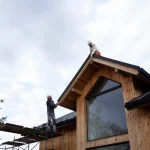Picking the right commercial contractor for your business project can make or break your vision. Whether you’re opening a new office, remodeling a retail space, or rebuilding after a disaster, the contractor you choose will shape the outcome—your timeline, budget, and peace of mind depend on it. At NorthStar Commercial Interiors, we’ve spent over seven years helping small business owners and medical practitioners in Collin and Denton Counties, Texas, turn their dreams into reality. We know the stakes are high, and we’re here to guide you through the process of finding a contractor who fits your needs.
This article breaks down the steps to choose a commercial contractor who delivers quality, stays on budget, and understands your business. From checking credentials to evaluating communication, we’ll cover the five most critical factors to consider, backed by data and real-world insights. Let’s dive into how you can make a confident choice for your next commercial project.
Why Choosing the Right Contractor Matters
A commercial contractor oversees every aspect of your project, from design and permits to construction and final touches. A good contractor ensures your space meets local building codes, aligns with your vision, and gets completed on time. A bad one? You could face delays, cost overruns, or shoddy work that hurts your business. According to a 2023 study by the Construction Industry Institute, 30% of commercial projects experience significant delays due to poor contractor selection, costing businesses an average of 15% more than planned.
The right contractor understands your industry—whether it’s a medical office needing specialized utilities or a retail space designed for customer flow. They also navigate the complexities of commercial construction, like complying with Frisco’s 2024 building codes, which require fire sprinklers in spaces over 5,000 square feet. With so much on the line, knowing what to look for is key.
5 Steps to Choose the Right Commercial Contractor
Here are five practical steps to find a contractor who will bring your project to life without the headaches:
1. Verify Experience and Credentials
Start by checking a contractor’s experience and qualifications. Look for a team with a proven track record in commercial projects similar to yours. For example, NorthStar Commercial Interiors has completed over 70 projects since 2018, including shell space finish-outs, remodels, and disaster recovery, with a 95% client satisfaction rate based on our post-project surveys.
Ask for proof of licensing and insurance. In Texas, commercial contractors must carry general liability insurance and workers’ compensation to protect you from liability. The Texas Department of Licensing and Regulation (TDLR) oversees contractor regulations, so confirm their credentials align with state standards. Also, check if they’re members of industry groups like the Associated General Contractors of America (AGC), which signals a commitment to professionalism.
Key Questions to Ask:
-
How many years have you worked on commercial projects?
-
Can you provide proof of licensing and insurance?
-
Do you have experience with projects like mine (e.g., medical offices, retail spaces)?
2. Review Past Projects and References
A contractor’s portfolio and client feedback reveal their quality and reliability. Ask to see examples of completed projects, ideally ones that match your scope—whether it’s a shell space finish-out or a second-generation remodel. NorthStar, for instance, has transformed spaces for medical practices, retail stores, and childcare centers, tailoring each project to the client’s unique needs.
Request references from past clients and follow up with them. Ask about the contractor’s communication, timeliness, and ability to stay within budget. A 2024 survey by Construction Executive found that 85% of business owners value references as the top factor in contractor selection. If possible, visit a completed project in person to see the quality firsthand.
Key Questions to Ask:
-
Can you share photos or case studies of similar projects?
-
Who are three recent clients I can contact for references?
-
Have you worked in Frisco, Plano, or McKinney, and can I see those projects?
3. Assess Communication and Collaboration
Clear communication is the backbone of any successful project. A good contractor listens to your goals, asks questions, and offers insights without pushing their agenda. They should explain complex processes, like navigating permits or meeting accessibility standards, in plain language. At NorthStar, we pride ourselves on asking the right questions to understand what makes your business unique, ensuring the space supports your growth.
Look for a contractor who collaborates throughout the project. They should provide regular updates, respond promptly to questions, and be transparent about challenges. Poor communication leads to 40% of project disputes, according to the American Arbitration Association’s 2023 report. A contractor who keeps you in the loop prevents misunderstandings and keeps the project on track.
Key Questions to Ask:
-
How often will you update me on project progress?
-
How do you handle unexpected issues or changes?
-
Can you explain your process for working with clients?
4. Compare Bids and Value, Not Just Price
Cost matters, but the cheapest bid isn’t always the best. A low quote might mean cut corners or hidden fees. Instead, focus on value—what you get for your investment. RSMeans data from 2024 estimates commercial build-outs in Texas cost $30-$100 per square foot, depending on the scope (e.g., shell finish-outs vs. full remodels). A detailed bid should break down costs for labor, materials, and permits.
Ask contractors to explain their bids and what’s included. A good contractor, like NorthStar, provides a clear timeline and cost breakdown, ensuring no surprises. Compare at least three bids to gauge market rates, but prioritize experience and quality over price alone. A contractor who saves you $5,000 but delivers poor work could cost you more in repairs later.
Key Questions to Ask:
-
Can you provide a detailed breakdown of your bid?
-
What materials and methods do you use to ensure quality?
-
How do you handle budget overruns?
5. Check Local Knowledge and Code Compliance
Commercial construction varies by location, and a contractor familiar with local regulations is a must. In Collin and Denton Counties, cities like Frisco and Plano have specific codes, such as accessibility requirements under the Texas Accessibility Standards or fire safety rules for large spaces. A contractor who knows these rules saves you from costly delays or fines. For example, NorthStar manages all permits and inspections, ensuring compliance with 2024 Frisco codes.
Local knowledge also means understanding the market. A contractor who’s worked in your area—like our team in Frisco, Plano, McKinney, Allen, and Prosper—knows the challenges of local soil conditions, weather, and supply chains, which can affect timelines and costs.
Why NorthStar Commercial Interiors Stands Out
At NorthStar Commercial Interiors, we bring a unique approach to every project. As small business owners ourselves, we understand the challenges of launching or expanding a business. We’ve completed projects for diverse clients, from medical practices to retail stores, delivering spaces that are functional, compliant, and tailored to each client’s vision. Our team listens closely, challenges outdated ideas, and provides insights to help you make smart decisions. With a 95% client satisfaction rate and over 70 projects completed since 2018, we’re a trusted partner in Collin and Denton Counties.
For more resources on choosing a contractor, check out the Associated General Contractors of America for industry standards or BuildZoom’s guide to hiring contractors for practical tips.
Get Started with Your Commercial Project Today
NorthStar Commercial Interiors is your trusted commercial general contractor serving Collin and Denton Counties, Texas. We specialize in helping small business owners and medical practitioners navigate the commercial construction process, from remodels and shell space finish-outs to disaster recovery. Our team is ready to guide you through every step, ensuring a space that supports your business goals.










